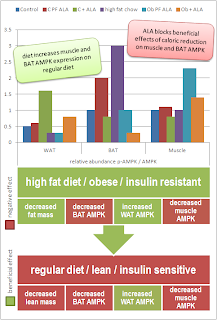Lean & Muscular W/ Alpha Lipoic Acid? You Could Be Just as Lean, But More Muscular W/out "Nutrient Repartitioner"!
 |
| Image 1: Lean enough? Ever thought it may be better to stop taking your ALA, now? |
Now you are listening, right?
Well, let's see what the Spanish researchers did, then. Basically Prieto-Hontoria and his colleagues repeated an experiment many other researchers have conducted before. They took a bunch of young male Wistar rats and fed them a...
- regular diet with a macronutrient ratio of 20/67/13 (protein, carbs, fats)
- regular diet + 0.25g racemic alpha lipoic acid per 100g chow
- high fat diet with a macronutrient ration of 20/20/60 (protein, carbs, fats)
- high fat diet + 0.25g racemic alpha lipoic acid per 100g chow
- regular diet, pair-fed receiving the same amount of chow as the regular diet + ALA group consumed voluntarily, but without the ALA content
- high fat diet, pair-fed receiving the same amount of chow as the high fat + ALA group consumed voluntarily, but without the ALA content
What's good for obese pre-diabetics on the standard American diet ...
Body weight and food intake were recorded every 2–3 days. And blood glucose, insulin, HOMA-IR, white adipose tissue mass, body total body weight gain, serum adiponectin levels and AMPK levels in white and brown adipose tissue, as well as skeletal muscle were determine at the end of the 8-week experimental period.
... can be detrimental for healthy, lean individuals whose ideal body image is not just skinny!
 |
| Figure 2: AMPK expression in white & brown fat and muscle (top, based on Prieto-Honta. 2012), and implications (bottom) |
"Hold on, what's all that AMPK b*s* about? Where's the connection to being lean & muscular?"
The downregulation of BAT AMPK activity, on the other hand, is as the analysis of the role of AMPK in cold thermogenesis by Mulligan et al. suggests, is a clear downside of ALA (Mulligan. 2007) and could in fact be related to its previously reported negative effects on thyroid metabolism, respectively the conversion of the "inactive prohormone" T4 to the metabolically active T3 (Segermann. 1991). Likewise, the reduction of skeletal muscle AMPK is not a benefit as the data in figure 1 clearly shows that the bro-scientific claims about muscle loss due to increased skeletal muscle AMPK activity don't hold. Something that should actually be obvious, in view of the role AMPK plays skeletal muscle glucose uptake, glycogen and ATP regulation (Kurth-Kraczek. 1999; Musi. 2002), and mitochondrial biogenesis (Hardie. 2010).
Is alpha lipoic acid for you? If you are lean, this study says "NO"!
Your best bet would to try and "exercise away" the negative effects on skeletal muscle AMPK expression, but let's be honest: Would you rather wear a helmet instead of simply stopping to hammer your head against the wall? You would, ha? In that case you are beyond help, I guess... go ahead then and do what works for your obese neighbor.
Note (I know someone is going to ask this): If anyone can show me peer-reviewed in-vivo data that confirms the constantly made claim that the physiological effects (not the petri-dish or XYZ-essay effects) of R-ALA are superior, not just on a gram-per-gram base, but qualitatively, tho those of the cheap and obviously less profitable racemic ALA (= natural mix of R- and S-ALA), I would be inclined to answer the question "wouldn't taking R-ALA maybe make a difference".
References:
- Hardie DG. Energy sensing by the AMP-activated protein kinase and its effects on muscle metabolism. Proc Nutr Soc. 2011 Feb;70(1):92-9. Epub 2010 Nov 11.
- Kurth-Kraczek EJ, Hirshman MF, Goodyear LJ, Winder WW. 5' AMP-activated protein kinase activation causes GLUT4 translocation in skeletal muscle. Diabetes. 1999 Aug;48(8):1667-71.
- Mulligan JD, Gonzalez AA, Stewart AM, Carey HV, Saupe KW. Upregulation of AMPK during cold exposure occurs via distinct mechanisms in brown and white adipose tissue of the mouse. J Physiol. 2007 Apr 15;580(Pt. 2):677-84.
- Musi N, Hirshman MF, Nygren J, Svanfeldt M, Bavenholm P, Rooyackers O, Zhou G, Williamson JM, Ljunqvist O, Efendic S, Moller DE, Thorell A, Goodyear LJ. Metformin increases AMP-activated protein kinase activity in skeletal muscle of subjects with type 2 diabetes. Diabetes. 2002 Jul;51(7):2074-81.
- Prieto-Hontoria PL, Pérez-Matute P, Fernández-Galilea M, Martínez JA, Moreno-Aliaga MJ. Effects of lipoic acid on AMPK and adiponectin in adipose tissue of low- and high-fat-fed rats. Eur J Nutr. 2012 Jun 5. [Epub ahead of print]
- Segermann J, Hotze A, Ulrich H, Rao GS. Effect of alpha-lipoic acid on the peripheral conversion of thyroxine to triiodothyronine and on serum lipid-, protein- and glucose levels. Arzneimittelforschung. 1991 Dec;41(12):1294-8.
- Shehzad A, Iqbal W, Shehzad O, Lee YS. Adiponectin: regulation of its production and its role in human diseases. Hormones (Athens). 2012 Jan-Mar;11(1):8-20.
- Yamauchi T, Kamon J, Waki H, Terauchi Y, Kubota N, Hara K, Mori Y, Ide T, Murakami K, Tsuboyama-Kasaoka N, Ezaki O, Akanuma Y, Gavrilova O, Vinson C, Reitman ML, Kagechika H, Shudo K, Yoda M, Nakano Y, Tobe K, Nagai R, Kimura S, Tomita M, Froguel P, Kadowaki T. The fat-derived hormone adiponectin reverses insulin resistance associated with both lipoatrophy and obesity. Nat Med. 2001 Aug;7(8):941-6.





